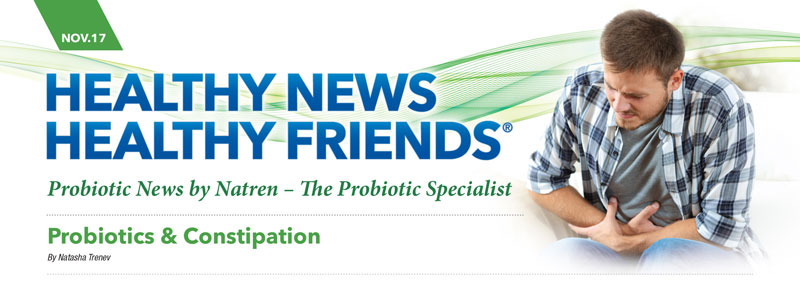Constipation is more than an uncomfortable inconvenience; it can be a sign of some serious health problems including a toxic gut, numerous types of GI cancer, and nerve or hormone problems. Allowing partially digested food to sit in the body for too long, without normal eliminations, can expose a person to a buildup of toxins. Poor eating habits, a sedentary lifestyle and certain medications can also cause symptoms of constipation. More recent research is bringing light to the imbalances of bacteria in the gut that play a role in constipation and the concept of restoring balance through the use of probiotics may be a promising new option.
Regular bowel movements are important to human health. The body absorbs vitamins, minerals, proteins and other nutrients as food travels through the digestive tract. Undigested food, waste products, and byproducts exit the body through stool during a bowel movement.
Bowel habits vary – some people have a bowel movement (BM) every day while others move their bowels once every two to three days. While the definition of “normal” varies slightly between individuals, medical professionals tend to agree that a daily bowel movement is best for keeping the body free of waste and toxic byproducts.
Now scientists believe that using beneficial bacteria, known as probiotics, can help prevent, treat and manage irregular bowel movements and other symptoms of constipation.
ABOUT CONSTIPATIONA doctor might diagnose someone as having constipation if the patient has three or fewer BMs per week, has small BMs, or has hard, dry stool that is painful or difficult to pass. Constipation can also cause abdominal pain or bloating.
Preventing and treating constipation involves dietary and lifestyle changes, medicines, and supplements. Eating a high-fiber diet, one that contains fruits, vegetables and legumes, can help prevent and manage symptoms of constipation. Stool softeners, laxatives and other medicines can improve GI motility to treat constipation, but often come with messy and undesirable side effects.
Probiotics supplements can help manage some of the symptoms of constipation, but only if they contain the right strain of beneficial bacteria. Natren’s DIGESTA-LAC, for example, contains a probiotic strain that promotes healthy digestion and regularity. Lactobacillus bulgaricus LB-51 super strain travels through the digestive tract with food during the process of digestion. Research shows certain strains of L. bulgaricus can promote regularity by stimulating function in the digestive tract. Probiotic supplements containing L. bulgaricus may alleviate the need for laxatives, which is important when treating constipation in older people and patients with serious illnesses.
PROBIOTICS AND COLONIC TRANSIT TIMESColonic transit time is the amount of time it takes for stool to move through the large intestine. Doctors can measure the time it takes for stool to move through the colon, but scientists disagree on what the measurements mean to human health.
Long colonic transit times usually mean that food remains in the gastrointestinal tract for the body to absorb water and nutrients, for example, but extremely long transit times allow waste products to sit in the bowels for too long. Excessively long transit times increase unhealthy disintegration of protein into potentially toxic substances.
STUDIES INVESTIGATING THE ROLE OF PROBIOITCS IN CONTROLLING SYMPTOMS OF CONSTIPATIONResearchers are looking into the use of microbiota-based therapy to alleviate constipation. A recent review listed a high-fiber diet and use of probiotics as important in the treatment of constipation symptoms. Authors of another review said that the gut microbiota and the chemical breakdown of food by bacteria (known as fermentation) are important to gut motility, and that using probiotics can improve motility.
Data shows that probiotics may improve transit time, stool frequency, and stool consistency. According to a recent study, probiotics can increase gut transit time by 12 hours, increase stool frequency by 1.5 stools per week, and improve some symptoms of constipation.
Constipation is a common problem among older adults. A recent study suggests treatment with probiotics could potentially be an alternative to traditional drug treatments for chronic constipation in older adults. Another study found that consuming a probiotic product could help alleviate constipation in patients with Parkinson’s disease.
This research makes it clear that altered gut microbiota play an important role in chronic constipation. Researchers continually work to learn how the beneficial microbes found in probiotics may improve symptoms of constipation and to discover how microbiota-based therapies can manage symptoms of chronic constipation. |
||
Natasha's
|




